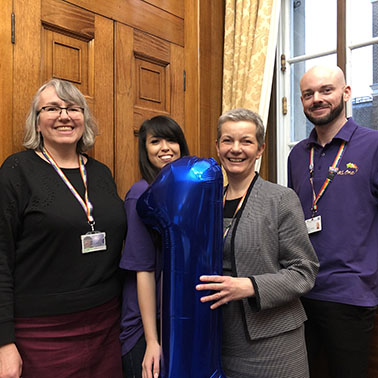Blog: Nursing associates - one year on the register
Published on 28 January 2020
Emma Westcott, Assistant Director, Strategy and Insight, reflects on the day one year ago when Nursing Associates first appeared on our register.
It is 28 January 2019: the date on which legislation dictates we must open the NMC register to our newest profession, nursing associates.
I have been told that the first periodic update to our register will occur at 3am and if everything we have been planning and testing works, this is when the first registered nursing associates will appear on the NMC register. I am armed with a handful of PIN numbers, and I feverishly punch them in two or three times before a result is found: a registered nursing associate, with effect from 28/1/19. I dance a little jig and slink back to bed.
A few hours later, I am on my way to St George’s Hospital in London, to do a live broadcast for Radio 4’s You and Yours programme about the newest additions to the nursing team. I am joined by three terrific nursing associates, and members of the Trust team who have supported their development. The nursing associates, as always, sell themselves: informed, thoughtful and delighted to be able to do more for people needing their care.
By the end of the day, social media is flooded with excited posts from nursing associates, and screenshots of their registration confirmations. Universities across England have been vying to produce the first registered nursing associates – take a bow, University of Lincoln.
A few weeks later, we’re at the Palace of Westminster for a parliamentary reception to celebrate the new nursing associate profession. It’s a wonderful opportunity to congratulate our new registrants, and to thank the dedicated nurses in education and in practice who worked so hard to pioneer a new programme and to provide great support and rich experiences for their students. The nursing associates are dressed to kill, and apply themselves with gusto this new experience, just as they have relished all of the opportunities and challenges thrown at them by pioneering a new profession. They dash off, mid-conversation, to bag a selfie with the Speaker of the House, John Bercow, and snap each other on the terrace with glasses of bubbly.
These joyful scenes round off two years of hard work: by national bodies, educators, employers, and - most of all – the nursing associates themselves.
It was not without its challenges and brickbats, so what kept everyone going?
At the heart of the nursing associate initiative is the premise that good quality education for staff providing frontline care will result in better outcomes for people using services. Much of that care is provided by dedicated and skilled people who have not benefitted from much education and training.
Many, but not all, lacked positive experiences of learning. Most had other life commitments that meant it was not possible to step away from paid work and take on debt in order to progress in their careers. But the experienced nurses they worked with knew who they were and had no hesitation in naming the people who could benefit from the nursing associate opportunity.
Many of the first nursing associates did not think they could achieve a foundation degree. When they passed a maths assessment, or an anatomy exam, they were ecstatic. My twitter feed filled with photos of test results. The students were amazing themselves, and everyone around them. Educators and employers commented on what a buzz they got from being part of their journey. Families bursting with pride. Mums and daughters starting courses together, laughing in disbelief at this unexpected turn of events. Graduation caps thrown in the air with the particular delight of people who never expected to be wearing them.
 Today there are now more than 1500 registered nursing associates practising in wide range of health and care settings, and many more in training. Some of the first nursing associates have embarked on their nursing degrees. One or two have joined education institutions in order to train the next cohorts.
Today there are now more than 1500 registered nursing associates practising in wide range of health and care settings, and many more in training. Some of the first nursing associates have embarked on their nursing degrees. One or two have joined education institutions in order to train the next cohorts.
I’m delighted that people are progressing in their learning and careers because of the nursing associate initiative. I love hearing about their great patient feedback, the appreciation of their nursing colleagues, and the excellence awards they are receiving from their employers. Sure, there are the blips and occasional negativity to navigate, but their peers are quick to provide moral support when it is needed. It’s been a privilege to help create not only a profession, but also a community.
We look forward to learning more about the impact of the new role from the national evaluation now underway, and to seeing what the new entrants do next, whether they consolidate their practice as nursing associates, or progress on to nursing degrees.
We’re delighted to have opened our register to nursing associates – you’re an asset.
Read our press release marking the one year anniversary.
Other recent news…
Blog: #FutureCommunityNurse: making the most of this opportunity
Published on 05 July 2021
Our Chief Executive and Registrar, Andrea Sutcliffe, explains why your involvement in our consultation on draft standards for community and public health nursin
Blog: What we’re doing to improve how we regulate, for the benefit of the people we serve
Published on 02 June 2021
In her latest blog, Andrea Sutcliffe, our Chief Executive and Registrar, explains what we’re doing to improve how we regulate, for the benefit of the people we
Blog: Better, safer regulation for the public
Published on 13 May 2021
Our Executive Director of Strategy and Insight, Matthew McClelland, explains why the Government's proposed changes to our legislative framework will allow us to






